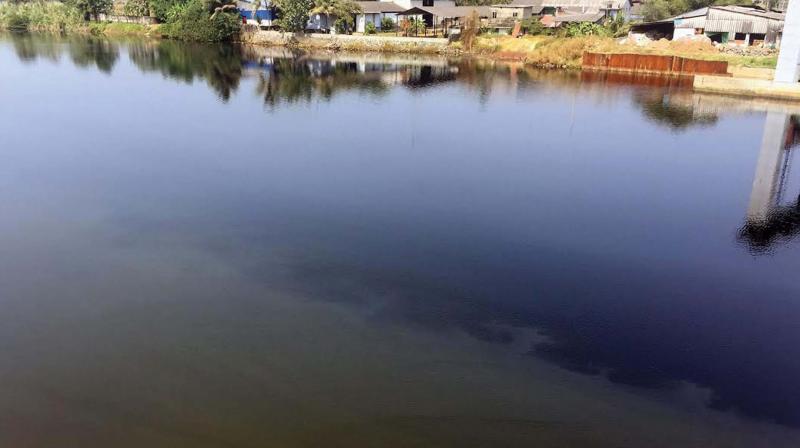To go green or not to
All industries which discharge effluents and are covered by the Air and Water Act should comply with the norms.

KOCHI: Implementation of the Supreme Court verdict directing industrial units to set up effluent treatment plants (ETPs) will now depend on the initiative the state government is willing to take, according to experts. The government will also have to make a lethargic Pollution Control Board with no data on the units covered by the apex court’s order move fast to ensure that they comply with its own order before the May 22 deadline it has set. All industries which discharge effluents and are covered by the Air and Water Act should comply with the norms. It is not only the highly polluting red category industries, moderate orange category and less polluting green industries which will be impacted by the order. Though the Supreme Court order is significant in that it can stop the state from slipping into an ecological disaster, the PCB has made no attempt to collate data on the units, which is the primary requirement for the effective implementation of the order.
The PCB will have to serve independent closure notice to polluting units before taking action, said Jacob Lazar, who was a member of the Local Area Environment Committee (LAEC) formed on the directions of the Supreme Court in 2004. “There will be little impact unless the government becomes proactive in the implementation of the government order,” Mr Lazar said. “I am skeptical about the whole exercise thanks to my experience. The Supreme Court orders in the past had failed to make any positive impact. In 2004, the Supreme Court has constituted a monitoring committee on hazardous waste management to check industrial pollution and to close down the erring units. Though Local Area Environment Committee (LAEC) was formed for Eloor and Edayar, the highly polluted industrial area in the state, no action could be taken against the polluting units.” The monitoring committee had ordered the closure of more than 90 units after inspecting various industries, the then UDF government sought more time for the companies to set up effluent treatment plants, he pointed out.
“Though the apex court intervention is a welcome move, it is most unlikely to resolve the issue of indiscriminate pollution by industries,” said Purushan Eloor, research coordinator of Periyar Malineekarana Virudha Samithi. “Either the industries will approach the court seeking relaxation or the state government will intervene as happened in previous cases.” The PCB, which had published an advertisement for lack of data has already started playing truant. “There are uncertainties over which all industries should come under the purview of the verdict,” conceded K. Sajeevan, PCB chairman. “It can be made applicable even for a small restaurant or food unit which has effluents. However, a panic situation requiring closure of all such commercial units has to be avoided.” On expiry of the three-month notice period, state PCB should carry out inspection of the units to ascertain the status of their effluent treatment plants and closure notice should be served. Even though effluent treatment facility is set up, the PCB has no permanent monitoring system to check its regular functioning. The Board has no enough staff to constitute monitoring squads.
Local bodies to set up common effluent treatment plants
The Supreme Court verdict is equally significant for the local bodies as they have been asked to set up common effluent treatment plants to cater to industrial, commercial and domestic beneficiaries. Being a major stakeholder, local bodies are responsible for addressing the unrestrained dumping of municipal and sewage waste to water bodies or to the soil, the court has observed. Unlike industries, the local bodies will get more time to set up the facility.
They have been asked to set up common effluent treatment plants within three years after acquiring land and completing other formalities. Local civic authorities may formulate norms to levy cess from users if they face financial crunch in the setting up of and running the treatment plants. The state government has to prioritise the cities, towns and villages which discharge industrial pollutants and sewer, directly into rivers and water bodies where the facility has to be immediately set up.
No database on effluent discharging industries
Despite being the implementing agency, the State Pollution Control Board has no database on the number of industries which has to be inspected for violation of effluent treatment norms. That the PCB had to publish an advertisement instead of informing individual units on the deadline itself shows the pathetic standards of the agency which has to implement the order. Though the state has more than 50,000 registered industries, only those units which have effluents will be impacted by the SC order.
The PCB has the list of registered industries, but there is no classification based on whether it is an effluent discharging unit or not. “There are uncertainties over implementation of the court order. Whether the commercial firms like hotels, restaurants, food processing and catering units come under its purview has to be confirmed. We are in the process of preparing a database based on the details we have said,” K. Sajeevan, PCB chairman. “However, PCB has no discretionary power in this regard and final decision on all such matters will be taken by the apex court. Except serving notice and issuing closure order, the Board has no other role,” he added.

